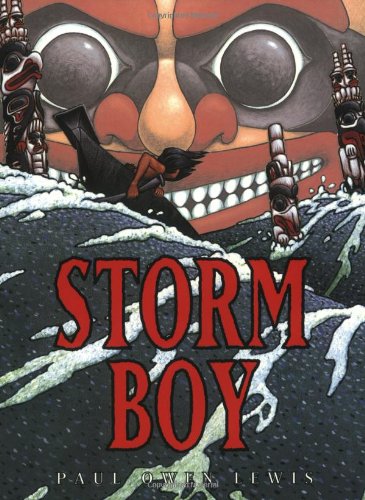 by Paul Owen Wilson
by Paul Owen Wilson
A storm is the setting for a Haida prince’s spiritual awakening.
Strategies/Skills Used
Reading Strategy 1: Access background knowledge.
Reading Strategy 2: Predict what will be learned or what will happen.
Reading Strategy 5: Make mental pictures.
Reading Strategy 6: Connect what you read with what you already know.
Reading Strategy 7: Determine the most important ideas and events and the relationship between them.
Reading Strategy 8: Extract information from text, charts, graphs, maps and illustrations.
Reading Strategy 10: Summarize what has been read.
 TEACHING THE ACTIVITY: PRE-READING
TEACHING THE ACTIVITY: PRE-READING
(1) Brainstorming. Ask the students if they have ever been away from home or away from their families for a long time. Ask them to think about how they felt being away from their familiar things and loved ones. Put students into groups of three or four. Then think-pair-share.
(2) Have each group create a web with the title “Away from Home” in the centre. See Semantic Mapping/Webbing. Ask students to brainstorm all the feelings or emotions they felt while they were away from home. Help them explore both positive and negative emotions (e.g. excited, sad, lonely). Use Handout 1 and Handout 2.
(3) Explain to students that they are going to listen to a fantasy story about a boy (a Haida prince) who finds himself far from his home and family. Ask them to listen carefully to the story and think about the feelings the boy experiences at different parts of the story.
 TEACHING THE ACTIVITY: DURING READING
TEACHING THE ACTIVITY: DURING READING
(4) Read Storm Boy out loud. Show students the illustrations and help them understand the culturally significant elements of the story (e.g. Haida motifs, costumes, potlatch ceremony). Refer to the Author’s Notes at the back of the book for cultural motifs that run throughout the story.
 (5) Stop reading at key points in the story to allow students to work with a partner, reflecting on the feelings and emotions the boy experiences. Have the students record the boy’s feelings and emotions on the Emotions Chart Graphic Organizer. Suggested stopping points are indicated on the chart. Continue reading the story after students have had a chance to respond and reflect. Model the first two reflections on the Emotions Chart with a think-aloud or together with the students as a shared write.
(5) Stop reading at key points in the story to allow students to work with a partner, reflecting on the feelings and emotions the boy experiences. Have the students record the boy’s feelings and emotions on the Emotions Chart Graphic Organizer. Suggested stopping points are indicated on the chart. Continue reading the story after students have had a chance to respond and reflect. Model the first two reflections on the Emotions Chart with a think-aloud or together with the students as a shared write.
(6) Continue reading up to and including the potlatch scene, which ends with the line “We are glad that the storm brought you to our village, but now you are thinking of your own.” Ask students to think about what the boy would say to his parents if he could write a letter to them. Students should spend a few minutes sharing with their partner, or with their original group of three or four students, discussing all the things the boy has experienced in his adventure (e.g. the storm, the strange village, regalia, the songs and dancing, the feast). Encourage students also to think about what things the boy might be missing about his own home and how he is feeling.
 TEACHING THE ACTIVITY: POST-READING
TEACHING THE ACTIVITY: POST-READING
(7) Acting as a scribe for the whole class, wlist the students’ ideas on three different chart papers with the following headings: Important Events, Feelings, What Does the Boy Miss About Home?
 (8) Have the students write a letter from the boy to his parents about all the exciting things he has experienced, his feelings about being away from his parents and the things he misses from his home. Options for the Letter Home include independent writing, small group response, and shared writing with the teacher scribing the letter (on an overhead or white board). Use sentence starters, short phrases with accompanying picture.
(8) Have the students write a letter from the boy to his parents about all the exciting things he has experienced, his feelings about being away from his parents and the things he misses from his home. Options for the Letter Home include independent writing, small group response, and shared writing with the teacher scribing the letter (on an overhead or white board). Use sentence starters, short phrases with accompanying picture.
(9) Have students work cooperatively to prepare possible conversations between different people in the boy’s village who would be involved in a search for him after the storm.
(10) Placemat rotation: ‘I wish,’ ‘I wonder,’ ‘I miss,’ ‘I’m reminded of…’